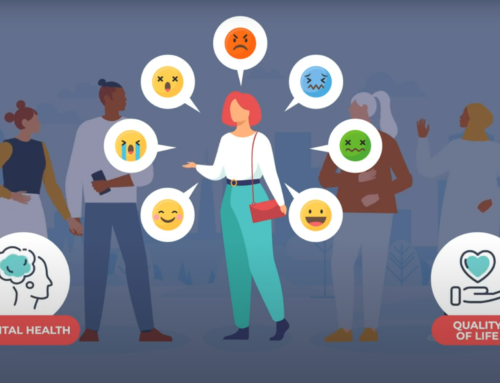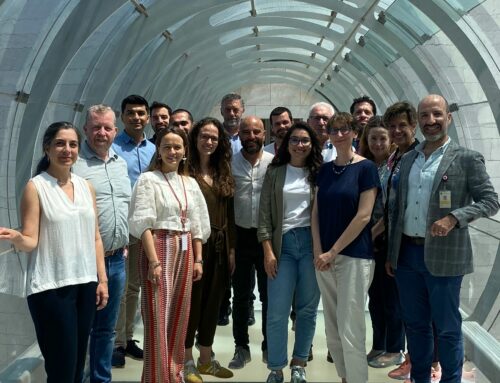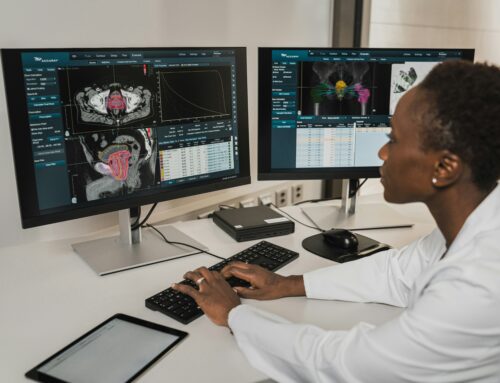The goal of the FAITH project is to create an innovative solution that tracks targeted depression markers in cancer survivors. The solution does so by using Artificial Intelligence-based technologies, aiming to monitor downward trajectories in these markers. Such mental health monitoring will enhance patients’ awareness of their own physical and psychological status; it will also inform their point of care (formal, such as their General Practitioner or Psychologist, or informal, for example their spouse or child) of possible deterioration. By doing this, cancer survivors who begin to experience mental health declines get the chance to receive as early as possible intelligent post-cancer support, and therefore, in the end, improve their quality of life.
The main potential users of the FAITH solution will be cancer survivors, their caregivers, as well as healthcare practitioners. The patients are provided with mobile Apps and sensors, the logic of which is linked to clinicians and healthcare organisations. The latter are responsible for receiving patient info and, together with the help of data scientists, apply and optimise AI-based algorithms on the collected data. The markers included in the mental health monitoring models cover four areas: outlook, sleep, activity and nutrition. Data comes both directly from the mobile app without user intervention, and from patients themselves in the form of replies to medical questionnaires.
Data-driven services: towards patient-centric healthcare
On the side of healthcare organisations, it is foreseen that in the next few years they shall incrementally evolve towards a loosely coupled architecture that will leverage the value of patient data across systems and rapidly develop and deploy patient-centric clinical and administrative workflows. The market for healthcare technologies is giving signs of growth; it also provides opportunities with significant changes and shifts towards a digital-service-enabled health, more patient-centric. AI-powered tools and virtual interactions between patients and care providers are growing as well. Data-driven interoperability and personalised diagnostics will accelerate the delivery of predictive-analysis-driven precision care. Subsequently, this will pave the way for better and more efficient decision making for the patient and the healthcare practitioners.
Investments related to health data integration, clinical applications and patient remote monitoring are expected to rise, confirming a trend toward the acceleration of patient engagement plans, digital patient experience, and clinical efficiency across the healthcare ecosystem. In the last months, we explored relevant markets in our effort to find out more about what features FAITH prospective users are valuing the most and the main opportunities arising in the commercial areas touched by FAITH. Of course, among the first market sectors our project identified as interesting, were the post-cancer treatment solutions and mental health support solutions. In addition, we also extended our research in activity tracking, nutrition tracking, sleep tracking and natural language processing markets.
Medical-oriented, post-cancer treatment Apps
At the level of medical-oriented post-cancer treatment Apps, we could summarise them under five main segments.
- Communicating information about cancer. They provide information in various ways, including factsheets/written information, news feeds and updates, questions and answers, and videos. Some Apps provide personalised info based on user-reported characteristics, including treatments received or disease subtype.
- Planning and organising cancer care. They allow patients to maintain a calendar of appointments, keep lists and scheduling of medications, and organise results or diaries of treatments.
- Interacting with others. These Apps let the user be part of an online social network of individuals with cancer. In other cases, they put them in contact with healthcare professionals who answer questions. Having access to personalised information can greatly help in strengthening the individual’s will, and improve day to day life.
- Enacting management strategies and adjusting to life with or beyond cancer. Allowing easy tracking of symptoms (fatigue, pain, mood changes, nausea and sleep problems). They also make it easier to monitor physical or physiological parameters (including pulse, blood pressure and weight), with or without customisation per patient.
- Getting feedback about cancer management. These Apps generate graphical summaries of their self-monitoring data for personal reflection (usually line graphs showing, for example, pain levels plotted against date/time). They also allow the generation of output reports from the data collected.
Psychology-oriented, mental health support Apps
At the level of psychology-oriented mental health support smartphone Apps, the market appears to be organised in four main segments.
- Mood companion/logbook. These pings the user to record their mood at certain times within the day. They also allow users to add how they are feeling, what they have been doing, etc.
- Mental health chatbot (stress, depression & anxiety therapy). Chatbots are systems able to converse and interact with human users using spoken, written, and visual languages. Chatbots using AI techniques can be the first line of support for mental health patients. They are especially useful for those who are reluctant to seek mental health advice.
- AI assisted mental health monitoring/therapy. Clinicians use these applications as a tool to monitor mental health and support the therapy of patients. AI combines with sensors and smartphone applications to enable increased monitoring capabilities.
- Mindfulness. Mindfulness is a type of meditation. It encourages you to focus on being intensely aware of what you’re sensing and feeling in the moment, without interpretation or judgement. It involves breathing methods, guided imagery, and other practices to relax the body and mind and help reduce stress. Several Apps exist, due to large demand as mindfulness has seen a lot of publicity and success recently.
Future directions of digital assistive tools
As a key takeaway from our market exploration, we can assume that all relevant markets are in a growing trajectory. This makes them appealing for offering new products to their users, but also to attract prospective users in the near future. The demand for technologies and services of care that are necessary after patients have been discharged from the hospital, in a temporary care to help them get back to normal and stay independent, shall grow. Therefore, looking at the upcoming popularisation of digital healthcare services and the rising demand for such services, we can rest assured that computation, AI and data-driven, personalised medicine is on the way to become a staple of healthcare.
From our market analysis, we were able to identify a conspicuous number of eHealth-related academic material and healthcare technologies. As a result, we created the FAITH Knowledge Database Dashboard. This continuously growing, open tool features existing knowledge and technologies on cancer survivorship and mental health.
Author: Stefanos Venios, Sotiris Koussouris, Dimitris Panopoulos of Suite5 Data Intelligence Solutions Limited




